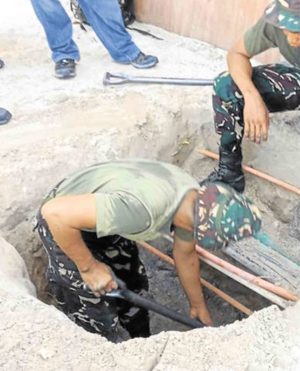
DIGGERS An Army trainee finds the location of an illegal pipe along the main beach of Boracay. —PHOTO COURTESY OF BORACAY INFORMER
ILOILO CITY — Military trainees have been sent to Boracay Island to help locate buried pipes suspected of illegally discharging waste water into the sea.
Armed with shovels, at least 100 trainees of the Army’s 3rd Infantry Division based in Camp Macario Peralta in Jamindan town, Capiz province on Friday started digging along the main beach on the eastern side of the resort island.
Environment Secretary Roy Cimatu, former chief of staff of the Armed Forces of the Philippines, briefed the trainees before they dispersed into teams along the beach.
They were expected to be in the island for three days to help in rehabilitation efforts.
33 polluting sites
Cimatu earlier said at least 33 sites along the beach were suspected to have buried pipes that discharge drainage or waste water into the sea.
The areas were identified by a team of the Mines and Geosciences Bureau of the Department of Environment and Natural Resources using a ground penetrating radar device that detects objects up to 70 meters beneath the surface.
Some of the pipes had been found earlier during digging by workers.
Cimatu had vowed to impose the maximum penalty on those confirmed to be responsible for installing the pipes.
But he also learned that the network of pipes had been installed by the government through the then Philippine Tourism Authority, now Tourism Infrastructure and Enterprise Zone Authority (Tieza), which is under the Department of Tourism.
Government approval
In a report on Friday, the Tieza and Boracay Island Water Co. Inc. (Boracay Water), one of two water service providers in Boracay, were quoted in a statement as saying the sewage system that Cimatu was referring to had been built long ago and with government approval.
“The major cause of manhole overflows and water pollution in Boracay is the refusal of many establishments to connect to the proper sewage system,” said a joint statement issued by Tieza and Boracay Water.
Many establishments had also “illegally tapped the drainage line,” the statement said.
Cimatu said illegal discharge of untreated wastewater into the sea through the pipes were responsible for results of water quality tests that showed a high coliform level despite the closure of Boracay to tourists.
Illegal structures
President Rodrigo Duterte, after describing the resort island as a cesspool, approved the closure of Boracay for six months starting on April 26 for a cleanup campaign.
This prompted government agencies to work double time in removing illegal structures built on the main road, beaches and forest lands.
Water service providers are also upgrading the island’s sewage and drainage systems.

